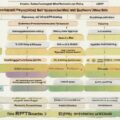Introduction
Acceptance and Commitment Therapy (ACT) is an evidence-based psychological intervention that can help improve mental health and wellbeing. Rather than trying to eliminate difficult thoughts and feelings, ACT focuses on accepting them as a natural part of human experience.
There are many simple yet powerful ACT tools and techniques that anyone can practice on their own to help reduce suffering and enhance life. This article shares 22 of them.
1. Defusion Techniques
Cognitive defusion techniques help create distance from thoughts so they have less impact and influence over our behavior. For example, you could:
- Sing thoughts out loud to give them less power
- Say “I’m having the thought that…” to create separation
- Give your thoughts funny voices to help dis-identify with them
2. Mindfulness Practices
Mindfulness means paying attention with openness, curiosity and flexibility. Practicing mindfulness of thoughts, feelings and sensations can ground us in the present moment.
3. Acceptance
Acceptance means embracing life and internal experiences as they arise without judging or trying to change them. We can practice radical acceptance of all parts of ourselves.
4. Self-as-Context
Connecting to the space of awareness that holds changing content creates perspective and reduces suffering. Think of yourself as the sky observing passing clouds of thought and emotion.
5. Values
Identifying your core values in domains like relationships, health, work and hobbies can help guide beneficial action. Ask what really matters to you deep down.
6. Committed Action
Setting goals aligned with your values and taking steps towards them regularly creates a meaningful life. Focus on actions within your control.
7. Willingness
Cultivating willingness to have discomfort helps reduce suffering. Practice allowing unpleasant thoughts and feelings to show up when they arise.
8. Self-Compassion
Treating ourselves with kindness and understanding helps increase psychological flexibility. Be warm towards yourself when you suffer.
9. Diffusion Statements
Saying phrases like “My mind is having the thought that I’m worthless” diffuses from unhelpful content while acknowledging it.
10. Noticing Triggers
Pay attention to internal or external experiences that commonly precede painful reactions. This helps break automatic behavioral patterns.
11. Behavior Analysis
Looking honestly at how your actions affect your quality of life will inform values-based choices to act differently.
12. Grounding
Simple grounding practices reconnect us to the present moment to reduce overwhelm. Notice your feet on the floor, your breath, sounds around you or other sense-based experiences.
13. Goal-Setting
Setting small, positive goals aligned with your values helps build patterns of meaningful action over time. Focus on process rather than outcome.
14. Gratitude Practice
Regularly writing or reflecting on things you feel grateful for has a wide range of mental and physical health benefits.
15. Creative Hopelessness
Allowing difficult internal experiences to arise without reacting to them reduces their power over time as you build distress tolerance skills.
16. Self-Encouragement
Talk to yourself with compassion when you face internal or external challenges. Be your own wise guide.
17. Unhooking
Notice when thoughts begin to spiral out of control and compassionately redirect your attention to something grounding like your breath or senses.
18. Vulnerability
Allowing ourselves to open up supports intimacy in relationships as we share authentic experiences. This builds trust and connection.
19. Trying Too Hard
Paradoxically accept and lean into failure, discomfort or embarrassment. Doing so reduces suffering and often leads to better outcomes.
20. Stop Rules
Notice when your mind says you “must” or “have to” do something. See if you can loosen rigid rules while still acting on your values.
21. Spirituality
Exploring personal meanings of spirituality relieves suffering for some by connecting to something bigger than oneself.
22. Letting Go
Practice actively releasing painful thoughts and feelings without judgement. Picture them floating away like balloons.
FAQ
What is ACT?
ACT stands for Acceptance and Commitment Therapy. It’s an evidence-based psychological intervention that focuses on accepting difficult thoughts and feelings while committing to action aligned with your values.
What are some basic ACT techniques?
Basic ACT techniques include defusion, mindfulness, acceptance, connecting to self-as-context, clarifying values, setting committed action, cultivating willingness, practicing self-compassion, and doing valued goal-setting and behavior analysis.
How do I get started with ACT?
Educate yourself about ACT principles, read about techniques online, watch YouTube videos, listen to psychology podcasts, and try exercises focused on acceptance, defusion and values. Notice what helps you build willingness and meaningful patterns of action.
When should I seek professional help with ACT?
It’s always wise to consult a licensed mental health professional if you have significant distress or functional impairment. An ACT therapist can help tailor practices to your unique needs and support your learning for positive change.
What happens if I practice ACT techniques?
With consistent practice over time, ACT helps reduce suffering, foster psychological flexibility, increase value-based action, improve relationships, support behavior change aligned with your goals, and enhance wellbeing and meaning.









